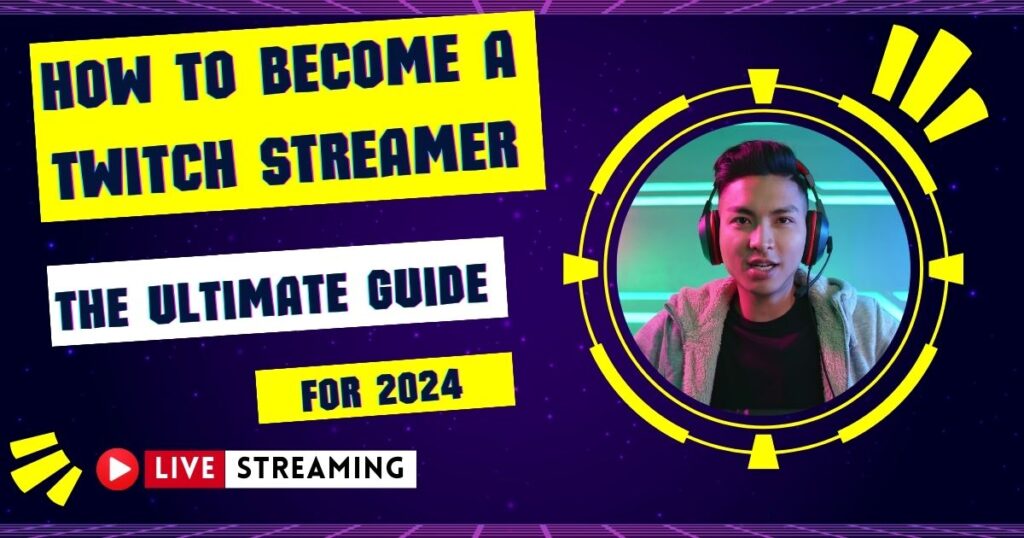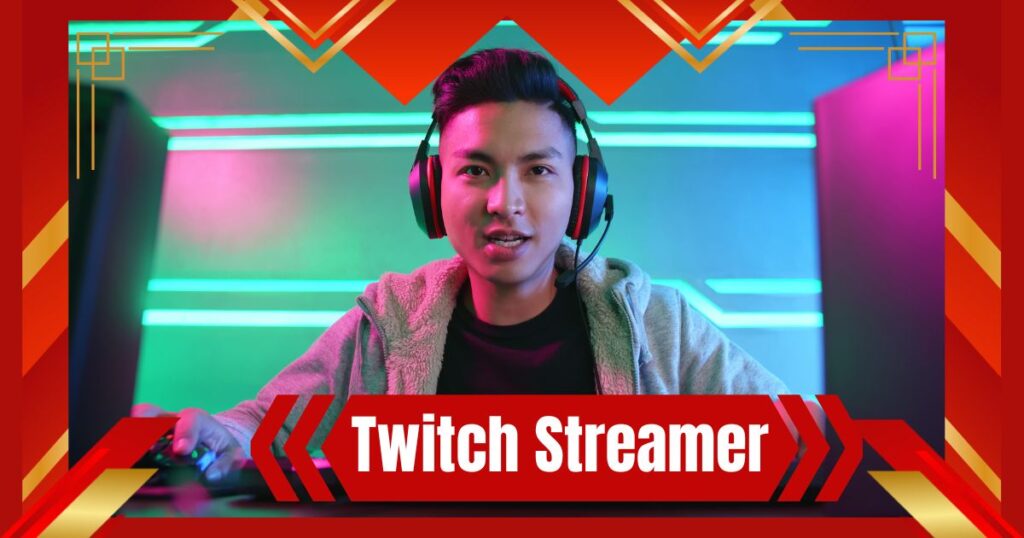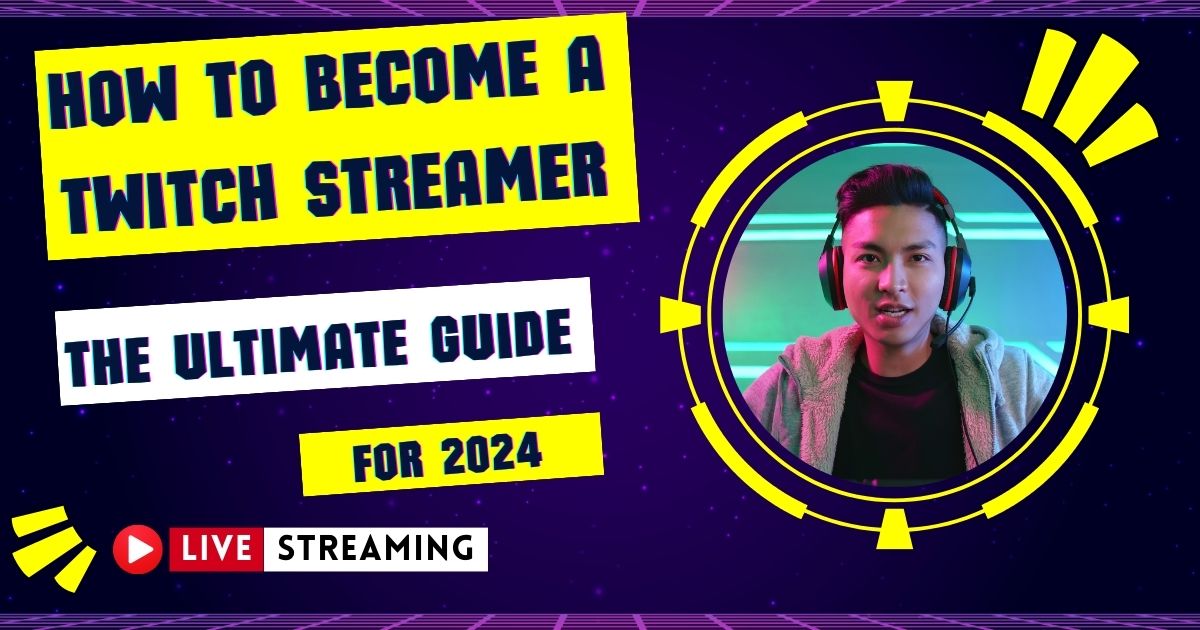How to Become a Twitch Streamer: The Ultimate Guide for 2024

Have you ever dreamed of turning your passion for gaming into a career? Or maybe you’re looking for a creative outlet to share your talents with the world. If so, becoming a Twitch streamer might be the perfect path for you. In this comprehensive guide, we’ll walk you through everything you need to know about how to become a Twitch streamer, from setting up your account to building a loyal following.
Twitch has become the go-to platform for live streaming, particularly in the gaming world. But it’s not just about video games anymore; you can stream everything from art and music to talk shows and cooking demonstrations. With over 140 million monthly active users, Twitch offers an incredible opportunity to connect with like-minded individuals and potentially make a living doing what you love.
So, are you ready to embark on your Twitch streaming journey? Let’s dive in and explore the exciting world of live streaming!
What is Twitch?

Before we get into the nitty-gritty of becoming a Twitch streamer, let’s take a moment to understand what Twitch is all about.
A Brief History of Twitch
Twitch.tv was launched in 2011 as a spin-off of the general-interest streaming platform Justin.tv. It quickly gained popularity among gamers and was acquired by Amazon in 2014 for nearly $1 billion. Since then, Twitch has grown exponentially, becoming the dominant force in live streaming.
Twitch’s Unique Appeal
What sets Twitch apart from other streaming platforms? It’s the sense of community and real-time interaction. Viewers can chat with streamers and other audience members, creating a dynamic and engaging experience. This interactivity is what makes Twitch so addictive and keeps people coming back for more.
Getting Started: How to Create a Twitch Account
Now that we understand what Twitch is, let’s take our first step towards becoming a streamer by creating an account.
Step-by-Step Guide to Making a Twitch Account
- Visit Twitch.tv and click on the “Sign Up” button in the top right corner.
- Enter your username, password, date of birth, and email address.
- Verify your email address by clicking the link sent to your inbox.
- Set up two-factor authentication for added security (highly recommended).
- Customize your profile by adding a profile picture and bio.
Remember, your username is important; it’s how people will identify you on the platform, so choose wisely!
Setting Up Your Twitch Stream
With your account created, it’s time to set up your stream. This involves both technical setup and content planning.
Technical Requirements for Streaming on Twitch
To start streaming, you’ll need:
- A reliable computer (PC or Mac)
- A stable internet connection (at least 3-6 Mbps upload speed)
- Broadcasting software (like OBS Studio or Streamlabs OBS)
- A microphone for commentary
- A webcam (optional, but recommended)
Choosing Your Streaming Software
OBS Studio and Streamlabs OBS is one of two popular, free options for broadcasting software. They allow you to set up scenes, add overlays, and manage your stream’s visual elements. Take some time to explore these tools and find the one that works best for you.
Setting Up Your Stream Layout
Your stream layout is like your virtual stage. It typically includes:
- Your gameplay or main content area
- A webcam feed of yourself
- Overlays for alerts, chat, and other information
Experiment with different layouts to find what works best for your content and style.
Choosing Your Content: What Will You Stream?
One of the most exciting (and sometimes challenging) aspects of becoming a Twitch streamer is deciding what content to stream.
Popular Categories on Twitch
While gaming is still the dominant category on Twitch, there are many other options:
- Just Chatting
- Music
- Art
- Talk Shows & Podcasts
- Sports
- Cooking
- IRL (In Real Life) streams
Finding Your Niche
To stand out on Twitch, it’s often helpful to find a specific niche. This could be:
- Speedrunning a particular game
- Providing educational content about a specific topic
- Creating unique art or music
- Hosting talk shows about niche interests
Remember, passion is key. Choose something you genuinely enjoy and can talk about for hours!
Developing Your Streaming Style
Your streaming style is what will set you apart from other streamers and help you build a loyal audience.
Crafting Your Streamer Persona
Your streamer persona doesn’t have to be radically different from your real-life personality, but it should be a slightly amplified version of yourself. Think about:
- Your tone of voice
- Your sense of humor
- How you interact with viewers
- Any catchphrases or recurring jokes you want to incorporate
Engaging with Your Audience
Interaction is key on Twitch. Make sure to:
- Greet viewers as they join your chat
- Respond to comments and questions
- Create opportunities for viewer participation (like polls or viewer-chosen challenges)
Remember, building a community is just as important as the content you’re streaming!
Essential Equipment for Twitch Streaming
While you can start streaming with just a computer and internet connection, investing in quality equipment can significantly improve your stream quality.
Must-Have Streaming Gear
- A good-quality microphone (e.g., Blue Yeti, Rode NT-USB)
- A HD webcam (e.g., Logitech C920)
- Lighting (a simple ring light can make a big difference)
- A second monitor for reading chat
Optional Equipment to Consider
As you grow, you might want to invest in:
- A green screen for background effects
- A stream deck for easy control of your stream
- A high-quality capture card for console gaming
Remember, you don’t need top-of-the-line equipment to start. Upgrade gradually as you grow your channel.
Optimizing Your Twitch Channel
A well-optimized Twitch channel can help attract and retain viewers.
Creating an Eye-Catching Profile
Your Twitch profile is like your storefront. Make sure to:
- Use a clear, recognizable profile picture
- Write an engaging bio that describes your content and schedule
- Add panels below your stream with additional information (social media links, rules, donation information, etc.)
Designing Stream Graphics
Consistent, professional-looking graphics can make your stream more appealing. Consider creating:
- A unique logo
- Stream overlays
- Offline screen
- Emotes and badges for subscribers
You can create these yourself using tools like Canva or hire a designer from platforms like Fiverr.
Building Your Twitch Community
Success on Twitch isn’t just about numbers; it’s about building a community of loyal viewers.
Fostering a Positive Chat Environment
Set clear rules for your chat and enforce them consistently. This might include:
- No hate speech or discrimination
- No spamming
- Be respectful to everyone
Creating Opportunities for Viewer Engagement
Engage your viewers beyond just gameplay. Consider:
- Hosting viewer game nights
- Q&A sessions
- Collaborative streams with other creators
Remember, your community is what will keep you motivated and help you grow on Twitch.
Promoting Your Twitch Channel
Even the best content needs promotion to be discovered. Here are some strategies to get your Twitch channel noticed:.
Leveraging Social Media
Use platforms like Twitter, Instagram, and TikTok to:
- Share highlights from your streams
- Announce your streaming schedule
- Engage with your audience between streams
Networking with Other Streamers
Building relationships with other streamers can help grow your audience. Try:
- Participating in raid trains
- Collaborating on streams
- Engaging genuinely with other streamers’ content
Creating Content on Other Platforms
Consider creating content on YouTube or other platforms to drive traffic to your Twitch channel. This could include:
- Stream highlights
- Tutorial videos related to your niche
- Behind-the-scenes content
Monetizing Your Twitch Stream
Once you’ve built an audience, you can start thinking about monetization.
Becoming a Twitch Affiliate
To become a Twitch Affiliate, you need to meet these requirements:
- At least 50 followers
- 500 total minutes broadcast in the last 30 days
- 7 unique broadcast days in the last 30 days
- An average of 3 concurrent viewers or more over the last 30 days
As an Affiliate, you can earn through subscriptions, bits, and game sales.
Striving for Twitch Partner Status
Becoming a Twitch partner offers more benefits and is the next step after becoming an affiliate. Requirements include:
- Stream for 25 hours in the last 30 days
- Stream on 12 different days in the last 30 days
- Average 75 viewers or more over the last 30 days
Additional Monetization Strategies
Beyond Twitch’s built-in monetization, consider:
- Sponsorships and brand deals
- Merchandise sales
- Donations through platforms like PayPal or Ko-fi
Remember, monetization should be a secondary concern to creating great content and building a community.
Balancing Streaming and Life
Streaming can be all-consuming, so it’s important to maintain a healthy balance.
Setting a Realistic Streaming Schedule
Consistency is key, but don’t overcommit. Start with a schedule you can maintain alongside your other responsibilities.
Taking Care of Your Physical and Mental Health
Streaming for long hours can take a toll. Make sure to:
- Take regular breaks
- Stay hydrated
- Exercise regularly
- Maintain relationships outside of streaming
Remember, a healthy streamer is a successful streamer!
Constantly Improving Your Stream
The world of streaming is always evolving, so it’s important to continuously improve your content.
Analyzing Your Stream Analytics
Twitch provides a wealth of data about your streams. Pay attention to:
- Which games or activities attract the most viewers?
- When your audience is most active,
- Which streams lead to the most follows or subscriptions?
Use this data to refine your content strategy.
Seeking Feedback and Implementing Changes
Don’t be afraid to ask your viewers for feedback. They can provide valuable insights into what’s working and what could be improved.
Conclusion
Becoming a successful Twitch streamer is a journey that requires passion, dedication, and perseverance. It’s not just about playing games or creating content; it’s about building a community, constantly improving, and sharing your unique perspective with the world.
Remember, everyone starts somewhere. Don’t get discouraged if growth is slow at first. Focus on creating content you’re proud of, engaging with your audience, and enjoying the process. With time, effort, and a bit of luck, you could join the ranks of successful Twitch streamers.
So, are you ready to start your Twitch streaming adventure? The world is waiting to see what you have to share. Happy streaming!
FAQs
- How old do you have to be to stream on Twitch?
You must be at least 13 years old to use Twitch. However, users between 13 and 18 need parental permission. - Can I stream on Twitch for free?
Yes, streaming on Twitch is free. You only need a Twitch account and streaming software, which can also be free. - How much money do Twitch streamers make?
Earnings vary widely. Some top streamers make millions, while others make little to nothing. It depends on factors like audience size, monetization methods, and consistency. - Do I need a powerful computer to stream on Twitch?
While a powerful computer helps, you can start streaming with a mid-range PC. The most important factors are a stable internet connection and a decent CPU. - Can I stream on Twitch without showing my face?
Absolutely! While many streamers use webcams, it’s not required. You can stream gameplay or other content without showing yourself. - How often should I stream on Twitch?
Consistency is key. Try to stream at least 3–4 times a week, but quality is more important than quantity. - Can I stream on Twitch from a console?
Yes, you can stream directly from the PlayStation and Xbox consoles. However, using a capture card with a PC offers more control and features. - How do I deal with toxic viewers?
Set clear chat rules, and don’t hesitate to time out or ban users who violate them. Remember, it’s your stream, and you control the environment. - Should I focus on one game or play a variety?
Both approaches can work. Focusing on one game can help you build expertise and a niche audience, while variety can attract a broader audience. - How important is it to have a schedule?
Very important. A consistent schedule helps viewers know when to expect you and builds habit-forming behavior.
I hope you are having a wonderful day!



